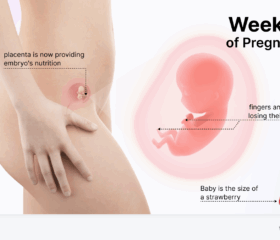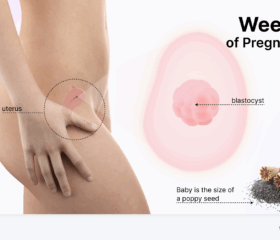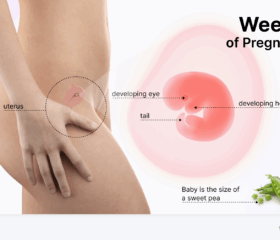Pregnancy Week by Week
12 Weeks Pregnant
Your baby is as big as a mandarin orange.
2.5
inches
0.49
ounces
12 Weeks Pregnant: Symptoms, Your Baby’s Development, and Tips
In many ways, you’re entering a less challenging phase of your pregnancy. However, there are still lots of noticeable changes happening to you and your baby.
Read on to learn exactly what’s going on with your baby, what symptoms you can expect, and how to look after yourself and your baby at 12 weeks pregnant.
Your baby at 12 weeks
Your baby is undergoing big changes. He’s now roughly the size of a mandarin orange, measuring 2–3 inches from crown to rump and weighing around 0.49 ounces. 1
Not only are most of your baby’s major organs and internal systems developed, he’s also grown many other features, like fingers, toes, and even facial characteristics.
Other notable changes and milestones this week include:
- Bodily systems: Many of your little one’s bodily systems, including his digestive, urinary, and circulatory systems, have formed and are starting their respective functions. For example, he’s beginning to consume amniotic fluid and pee it out.
- Major features: More than 90% of the 4,500+ structures that will eventually be in your baby’s body have formed by your 12th week of pregnancy. 2
- Heart: Your baby’s heart rate has increased to 165 beats per minute. 3
- Vocal cords: His voice box and larynx are both starting to form in his trachea. 4
- Blood: Inside your baby’s bone marrow, blood is also beginning to form.
- Emerging reflexes: Your baby has started developing his reflexes. If you press your belly during an ultrasound, you might even see him respond.
Can you tell your baby’s sex at 12 weeks?
This is around when you’ll first be able to see your baby’s sex during an ultrasound—theoretically, anyway.
However, in practice, this early, his anatomy will still probably be too difficult to make out. That said, if you take a DNA blood test to check for chromosomal disorders, this will also tell you if you’re having a boy or a girl.
Is it safe to use an over-the-counter fetal Doppler at home?
Many expecting mothers get excited at the possibility of hearing their little one’s heartbeat. By week 12, your baby’s heart has started beating, and you’ll often be able to hear it by using a tool called a fetal Doppler.
Your doctor will probably use one of these devices during your next ultrasound. Some women can’t wait for that fetal Doppler ultrasound, and choose to buy an over-the-counter Doppler to use at home.
It’s up to you whether you want to do this, but you should know that Doppler devices can be tricky to use. When you haven’t been medically trained, trying to operate one—and interpreting what you see—can provoke unnecessary stress and anxiety, neither of which you need more of when you’re pregnant.
What’s more, the Food and Drug Administration (FDA) says that untrained use of the devices can “expose the fetus to prolonged and unsafe energy levels.” 5 Most experts say it’s best to rely on your doctor for routine monitoring.

Your body at 12 weeks
When it comes to your body, you’ll be happy to hear that those uncomfortable first-trimester pregnancy symptoms, like nausea and the constant need to pee, will soon subside.
However, the transition into your second trimester will come with its own unique changes. Here’s what you can expect at 12 weeks:
- No more morning sickness: Your hormone levels are fluctuating less, which means you’ll get a reprieve from the morning sickness that probably characterized much of your first trimester. However, if you’re carrying twins, you may feel nauseous for a little longer.
- More energy: Your body is adjusting to accommodate the growing life inside of you. You’ll probably see a noticeable jump in your energy levels, although here again, if you have twins, you might feel tired for a few more weeks.
- Headaches: Although you’re saying goodbye to morning sickness, your hormones are still in flux. This means that you may still get the occasional headache while pregnant.
- Dizzy spells: You may have dizzy spells, caused by shifts in your blood pressure.
- Spotting: Your cervix is sensitive right now, which means that you may experience light spotting. If you do, tell your doctor immediately, especially if you get cramps or the flow is particularly heavy.
- Increased vaginal discharge: You might notice more vaginal discharge while pregnant, but don’t worry. This watery pregnancy discharge is a sign that your vagina is protecting itself from infection. However, any changes in the discharge’s odor or color (e.g., yellow or brown discharge) warrant a consultation with your OB.
- Increased libido: It’s normal for your sex drive to increase in the second trimester, although this isn’t universal and varies from person to person. (On that note, at this stage, sex during pregnancy is OK as long as your OB has determined that you don’t have any high-risk conditions that make vaginal penetration unsafe.)
- Sore breasts: You may have to contend with breast pain during pregnancy as your body readies itself for breastfeeding.
- Dark spots on your face: Don’t worry, this is normal. It’s called melasma, also known as the “mask of pregnancy.”
- Excess saliva: You may find yourself producing more saliva, and may feel particularly sensitive to certain smells (or tastes).
Keep track of your symptoms in a journal or pregnancy tracker app so that you know what to bring to your doctor’s attention if there are any issues. The best pregnancy trackers also include tips on what to expect going forward into the next trimester and can help your track your overall health, including your vaccinations (e.g., to log it if you get the flu shot while pregnant).
Flaunt that baby bump!
During the last week of your first trimester, you may start showing.
As your baby bump becomes more pronounced, it might be a good time to share the good news with your family and friends. Of course, when to announce your pregnancy is always a personal decision, and there’s no need to rush if you don’t feel like the time is right.
If you haven’t already, now’s also a perfect time to start documenting your belly and your baby’s growth.
Be aware that as your baby bump grows, the tissues surrounding your belly will feel more pressure. This can trigger further symptoms—mainly digestive changes, like gas or constipation.
What are the risks of miscarriage at 12 weeks?
You can rest easier knowing that there’s a significant drop in the risk of miscarriage after the first trimester. By the 12th week, your baby has completed most of his critical development milestones. Around 80% of miscarriages occur before this point, so you’re nearly in the clear. 6
How to look after yourself and your baby at 12 weeks
Even though your symptoms are fading, you still need to take steps to look after yourself and your developing baby. Here are some tips for how to manage your 12th week of pregnancy:
Eat and drink well
You’ll need more food than usual as you enter your second trimester. Aim to get an extra 300 calories per day.
Sadly, that doesn’t mean it’s OK to stock up on sugary snacks. Stick to a healthy pregnancy diet and focus on eating:
- Fresh fruit
- Vegetables
- Lean proteins
- Whole grains
Avoid sugary, fatty, and processed foods and opt for healthy pregnancy snacks like trail mix and whole wheat pretzel. Your doctor can help you find more personalized options to suit your dietary preferences and any allergies you have.
Make sure to stay hydrated, too; this will support your increased blood volume and aid your digestion. Try to drink at least 8 to 12 cups (64–96 oz) of water per day when you’re pregnant. 7
Stay active
Regular exercise can help you manage your weight, reduce your body pains, and improve your overall cardiovascular health (which will keep your baby healthier, too).
Some of the best pregnancy workouts include walking, swimming, and yoga. Remember to get the OK from your doctor before starting any new workout plan.
Look after your skin
Hormonal changes can make your skin more sensitive, potentially causing melasma (dark facial spots). Use sunscreen, wear protective clothing, and stay in shaded areas when you’re outdoors.
These hormonal shifts can also trigger pregnancy acne. Stick to a gentle skincare routine. It’s generally safe to use mild cleansers with ingredients like topical erythromycin, clindamycin, benzoyl peroxide, or azelaic acid, but always confirm that with your doctor first.
Stay away from products with isotretinoin or retinoids (these are forms of Vitamin A that may increase your baby’s chance of developing birth defects).
Prioritize your self care
While you’ll probably suffer fewer mood swings in your second trimester, it’s normal to still have emotional ups and downs and to sometimes feel overwhelmed. Make sure you’re getting enough rest to allow your body to adapt to the demands of pregnancy.
Now’s also a decent time to start wearing maternity clothes (or just investing in them, if your clothes still fit). These will generally be more comfortable, and there’s no shortage of stylish options to choose from.
Final thoughts
Congratulations on making it to week 12 of your pregnancy! The finish line of your first trimester is well within your reach.
Again, take steps to maintain your physical and mental wellbeing, keep in contact with your doctor, and reach out to your support network when you need it. You’ve made great progress so far, and soon, you’ll really start to enjoy your pregnancy.
Article Sources
- American Pregnancy Association. "12 Weeks Pregnant" Retrieved June 24, 2025.
- The Virtual Human Embryo. "Carnegie Stage 23 Introduction" Retrieved June 24, 2025.
- The Endowment for Human Development. "Prenatal Form and Function – The Making of an Earth Suit" Retrieved June 24, 2025.
- Johns Hopkins Medicine. "The First Trimester" Retrieved June 24, 2025.
- U.S. Food & Drug Administration. "Ultrasound Imaging" Retrieved June 24, 2025.
- UC David Health. "What you should know about miscarriage signs, early miscarriage and more" Retrieved June 24, 2025.
- American College of Obstetricians and Gynecologists. "How much water should I drink during pregnancy?" Retrieved June 24, 2025.







